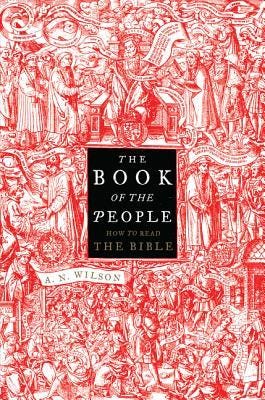A. N. Wilson’s The Book of the People is an exploration of the Bible, or more specifically ways of reading the Bible, largely organized around the author’s own developing relationship with the text. Wilson begins as hostile to religion, a view understandably born from witnessing the divisiveness and violence of so much religion in the world, particularly in the Middle East. Yet through conversations with his friend L., who may or may not have existed but who is certainly a “composite figure,” Wilson is brought to a more nuanced understanding, one characterized by a recognition of the Bible’s “mythic” character.
By “mythic,” Wilson does not mean that he believes nothing in the Bible is historically true, but that the value of the text is in how it speaks to the imagination of its readers, creating a dynamic relationship that leads to creative response. The Bible is “the book of the people,” for Wilson, because it continues to speak to its readers, to transcend all imposed interpretations, and to flaunt contemporary categories of “fiction” and “history.” It is not possible, Wilson argues rather convincingly, to view biblical texts either as pure literary constructs or as forensic history, and doing so is less than useful. A better approach is creative, imaginative engagement and response. “The truths which these mythologies convey,” he writes, “have inspired some of the most heroic lives, some of the most stupendous buildings, some of the most glorious works of music and art in the world’s history.”
The sclerotic readings of both religious fundamentalists and hardline atheists are mere impositions of calcified assumptions that find in the book only excuses for more hatred and violence. It is through allowing the Bible to speak to us as myth, as patterns applicable to our own lives, as reflecting our own stories and so calling for our own participation in those larger patterns, that we begin creative engagement, and this allows for an unending range of responses, from writing poetry to constructing monuments to fighting for social justice. To read in this way is to participate in the meaning of the text. As Wilson says, “the real Bible was the creation of many writers and - just as important - many translators, and - even more important - many readers who soaked it up, reading it daily until it became part of their lives, and until their lives became part of it.”
Some reviewers have found The Book of the People meandering, arguing that its structure fails to congeal into a coherent biblical reading. While this is true to an extent, the criticism misses the point, for Wilson is not arguing for a specific interpretation of the Bible, though he does present his own readings. To insist on these as absolute, however, would be contrary to the creative engagement that he is advocating. He is arguing against fundamentalist approaches, both religious and nonreligious, or indeed any reading that would force a particular, narrow set of assumptions upon the text for dubious reasons. The Bible does not belong to anybody, and so its interpretation is open to all, and it is constantly changing even for the individual. The book is largely about the relationship between Wilson and the Bible, as refracted through his dialogues with L., and his own maturing understanding, but this is offered as an illustration of the approach he advocates, not as a rule.
This is more valuable, for it encourages one to read the texts for oneself. Wilson’s book is a plea for the inheritors of biblical tradition to once again read the book, but to read it imaginitively, to not let the treasure of that inheritance disappear. That does not mean we must read it the same way our ancestors did, but to lose familiarity with the Bible is to lose a vital connection with the past. That connection is threatened as much by uninspired literalist readings as it is by indifference or even hostility, for the former often leads to the latter, and both ignore what is and has been most vital about scripture. Wilson understands why one would reject the Bible, or religion more generally, but he offers his own journey as a path through the narrowness of both shallow atheism and unreflective religiosity toward a more nuanced view, one that does not require immediate commitments but that allows for a generosity of spirit, an openness to those stories that have been lifegiving for so many.
Nevertheless, it is fairly clear that The Book of the People points in the direction of Christian faith, at least for its author. But it is not an apologetic work, only a deeply personal one, and it is all the stronger as a result. I imagine that those who do not agree with Wilson would find it equally so, though I can only assume this. For me, at least, it is one of the best and most inspiring books I have read on the Bible and the one most likely to get me back into an established routine of scripture reading. This alone requires that I give it my highest recommendation.






